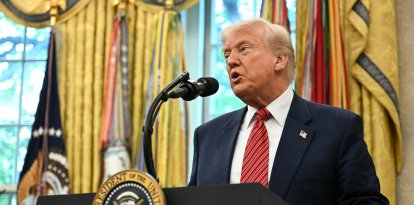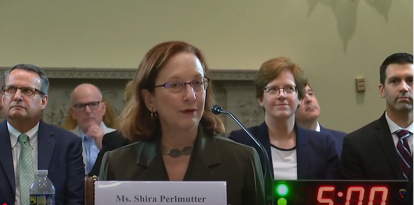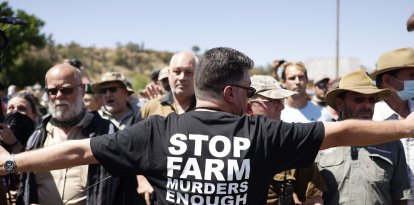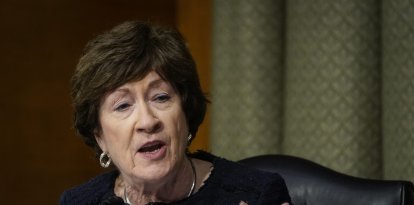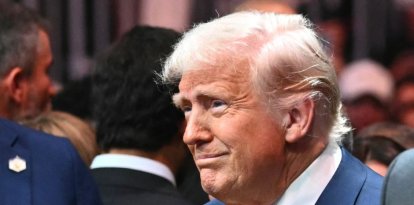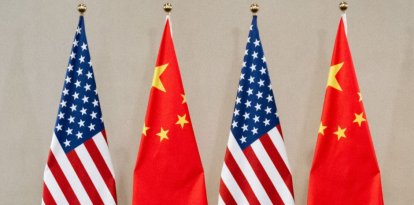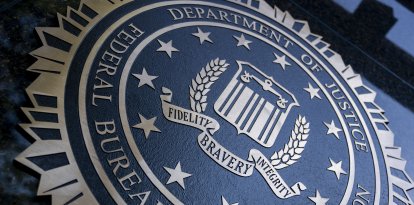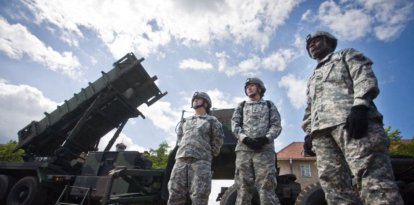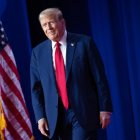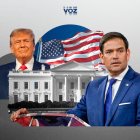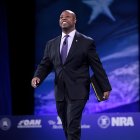The step by step of Trump's VP decision: This is the exhaustive process to choose a running mate
The tycoon still can't decide between Marco Rubio, JD Vance, Doug Burgum and a few other names that are still floating around in his head. As publicized, he will announce it during the week of the Republican National Convention (RNC), which will begin on Monday, July 15.
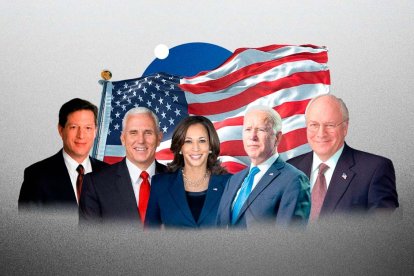
Design Voz Media/
Donald Trump became the presumptive Republican nominee on March 6, when Nikki Haley abandoned the primaries. Although this was a relief for the magnate, since he no longer had to allocate funds to defeat his opponent, it also became a hardship since it marked the beginning of the search for his running mate to try to defeat Joe Biden in November.
Trump is not new to this, as he went through the same process in 2016 when he finally elected Mike Pence. Although the formula was a winner, the former governor of Indiana is further away than ever from his former boss, so the campaign must resume what is known as the "Vetting process."
However, this election turns out to be much more consequential than the one eight years ago since, if he wins at the polls, the person accompanying him would start as a favorite for the 2028 Republican nomination, given that the tycoon cannot seek another term.
It is an exhaustive process that can last several months and generate endless anecdotes and books until finally, the candidate in question, in this case, Trump, publicly announces the name of the person who will accompany him on the ballot for the presidential elections.
How does one choose a running mate?
Of course, the first rule is that the person in question does not harm the ticket, but when choosing a running mate, there are a series of fundamental issues that cannot be ignored when weighing the decision:
- The state of origin
- The type of voter you appeal to
- The balance that can be brought to the formula (in terms of age, skin color, religion, experience and ideology)
- Your ability to raise funds
This balance often works, such as when President Barack Obama chose Biden to accompany him in 2008 or when Trump opted for the then-governor of Indiana, Mike Pence. Unfortunately, that balance sometimes doesn't work out well, whether due to unforced errors or simply because it is a hostile year for the game. We can take a few fairly recent cases, such as John McCain choosing Sara Palin or today's Senator Mitt Romney with Paul Ryan. In short, any presidential election is a zero-sum game, where one person's gain translates into the other's loss.
Take the case of Obama with Biden. This is one of the most interesting examples of balance: the envy of scale manufacturers. On the one hand, Barack Obama, a 46-year-old junior senator, relatively young to seek “free world leadership,” popular among young progressives, Latinos and voters of color. On the other side was Joe Biden, who had spent more of his life in the Senate than outside it. Sixty-five years of pure experience and a few more frictions, seen at that time as a moderate capable of attracting votes from older white people, independent voters and the occasional Republican from the most centrist wing dissatisfied with George W. Bush. It didn't go badly for them. They obtained ten million more votes than their Republican counterpart and a categorical victory in the electoral college: 365 to 173.
The famous "Vetting process"
This selection is carried out through what is known as the "Vetting Process." It is simply the casting of names to be selected, which go through an extremely fine filter, which is usually directed by a team of lawyers and campaign advisors who leave nothing to chance.
The kick-off is given with all the public information available about the people in question, such as speeches, romances, posts on social media and writings, which can go back to their university years. Once everything that the Internet can cough up is collected, the staff in charge makes an initial filter, prepares an initial report on what is public, and discusses it privately with the eventual presidential nominee.
This is where the second filter occurs, which is carried out by the candidate, who chooses to discard some names and ask for more information about others, who, of course, are still in the race.
At this stage of the process, which is still very preliminary but with the roadmap ready, these names are subjected to a much more forceful and incisive review. Indeed, and without exaggeration, the team surveys absolutely all aspects of the lives of the people in question, as long as they previously consented to the process.
The questionnaires, which can have from 50 to 150 of the most invasive questions, help campaign lawyers know where to continue investigating to shield the eventual formula from certain attacks by its rivals.
“They should ask you everything, from whether you have paid your taxes to whether you have downloaded porn (example of the McCain questionnaire in 2008) or if you have children you know nothing about. I mean, people are asked all kinds of things, so anyone who enters the process has to know that it is quite invasive,” said Alyssa Mastromonaco, who was part of this process for John Kerry in 2004 and for Barack Obama in 2008, she revealed details about the process on Pod Save America.
There were also cases in which the team had to 'protect' the candidate from their own tastes and preferences. The most famous case is that of McCain in 2008, who wanted independent Senator Joe Lieberman as his running mate, a Democrat for almost his entire career and in favor of abortion, which would have contrasted sharply with the GOP.
What could be disqualifying for a candidate?
When answering this question, Mastromonaco assured that it should be something “that is not defensible.” Of course, being considered for vice president extends to the family, given that the complete package is being purchased. Therefore, the activity of the couple and children is also reviewed in depth.
This concept of something “not defendable” has changed over the years, given that many previously disqualifying things would not be. For example, in 1972, George McGovern had chosen and announced Senator Tom Eagleton as his running mate to try to oust Richard Nixon from the White House. However, Eagleton himself stepped aside just days later after it emerged that he had undergone shock therapy and other treatments to treat depression.
Of course, some topics are not disqualifying, but if they escape the 'Vetting Process' and are discovered by the press once the formula is announced, it can be extremely damaging to the campaign in general.
Hand-to-hand interviews
At this point, and leaving aside the exotic and discreet nature of the situation, the process becomes the closest thing to a regular job interview. Between four and eight potential running mates are estimated to reach these stages.
At least two trusted people for the presidential candidate, in the case of Biden, one of them was former senator Chris Dodd, interviews the finalists in person to talk more personally about them, their beliefs by topic and what type of relationship president-vice president were looking for.
Biden, in 2008, made it clear to Obama's team that he did not want to become a figurehead since, at that time, he was perhaps the most powerful Democratic senator. The then-chairman of the Foreign Relations Committee wanted to be "the last person in the room" with the eventual president before making important decisions.
Discretion is a fundamental part of the interview process, both for the candidate's team and for those of the interviewees. Indeed, in 2020, it emerged that Dodd had not been very comfortable with Kamala Harris, especially about how she defended herself against attacks on Biden during the presidential debates, which angered the campaign behind closed doors.
Mastromonaco recalled in the interview the effort that Obama's team had to make in 2008 so that the names of those interviewed did not become known, in that case, Tim Kaine, Evan Bayh and Biden, who were assigned code names C1, C2 and C3.
In this part of the process, the mistrust between the teams of those aspiring to the position is total and absolute. Even in 2020, they have come to think that another team was making things known to the press to discredit their opponents.
Once these interviews have been carried out, the last step is a conversation with the candidate for president, the "final boss," who can ultimately confirm the tendency of his team or elevate someone who perhaps had the slightest chance until now, as happened in 2012 with Mitt Romney and Paul Ryan, whose chemistry at a luncheon was instrumental in the election of the then-Wisconsin congressman and the displacement of then-favorite Rob Portman.
After what can be weeks of deliberation, the candidate confirms his choice to his inner circle. The name is then communicated to a select group of people until the day of the announcement.
This selection must be made before the party conventions, so the Trump campaign must finish the job somewhat before Monday, July 15.
Some case studies: Harris and Pence
The last two to emerge victorious from this tedious process were Kamala Harris in 2020 and Mike Pence in 2016. From newest to oldest, Harris was favored by Biden's promise to choose a woman to accompany him on the ticket, but her path to the ticket was uphill due to the famous exchange that the two had in one of the Democratic debates.
First, clarifying that she did not consider Biden a “racist,” she criticized him for having praised and worked with segregationist senators of the 20th century, such as Strom Thurmond, to oppose the "Busing" policy, which consisted of bus transportation as a means to eliminate segregation in American schools.
“There was a girl in California who was part of the second class to integrate her public schools and who rode the bus to school every day. That little girl was me,” Harris shot, looking at Biden, generating one of the most viral moments of that electoral cycle.
This blow had also not gone unnoticed by Biden's family, especially his wife Jill and his sister Valerie. The failed campaign of the then-senator also did not turn out to be very encouraging for Biden's main associates, who looked a little more fondly on Elizabeth Warren, Susan Rice, Karen Bass and Gretchen Whitmer.
"Are you ready to go to work?"
However, since the pandemic greatly limited face-to-face contact, those candidates previously known to Biden gained some points. In Harris' case, it was her friendship with Beau Biden, Joe Biden's eldest son, who had recently died.
She began to climb positions with her performance in face-to-face interviews, which added to her contrast with Biden by age and race. The latter ended up being very important after the George Floyd case. "I think he came to the conclusion that he should elect a black woman," Harry Reid, former Senate Democratic leader, later noted.
With this in mind, both Rice and Bass competed closely with Harris but were ruled out for different reasons. In the case of Rice, a personal friend of Biden, she had never sought elected office before, so they didn't know what to expect from her on the campaign. As for Bass, her declarations of admiration for Fidel Castro were definitely going to be a liability with Hispanics in Arizona, Nevada and mainly Florida.
“No other candidate scored so highly by Biden's selection committee on so many of its basic criteria for choosing a running mate, including her ability to help Biden win in November, her strength as a debater, her qualifications to govern and the racial diversity she would bring to the ticket. No other candidate seemed better suited to the political moment,” The New York Times reported.
After intense scrutiny, Biden confirmed his decision with his team and proceeded to call the finalists by phone to thank them. As for Harris, he contacted her via video call and asked her the following: "Are you ready to go to work?"
"The night a flat tire changed the course of American history".
The Mike Pence case was the closest thing to a movie in which an unexpected event (some say intentional) drastically changed the plot. The Trump campaign's selection process, led by Arthur B. Culvahouse, Jr., had left three clear finalists: Chris Christie, Newt Gingrich and Pence himself. The first began as the magnate's favorite, the second was the campaign's favorite and the third was the ideal option for the Trump family.
Tom LoBianco, in his book "Piety & Power: Mike Pence and the Taking of the White House," tells the interesting and eventful story of how the planets aligned so that the 2016 Republican ticket ended up being Trump-Pence.
The then-presumptive nominee held a campaign event in Indianapolis on July 12 for 25 major donors, which included a subsequent meeting with Pence, still the acting governor of Indiana. As attendees were taking pictures with the candidate, it was Jeff Carwell's turn, advisor and friend of potential running mate. "You two would be the best public-private partnership in history," Cardwell told him, prompting a smile from Trump, who confessed that his final choice would go through Gingrich and the local.
A key piece of information was that the magnate's plane had a small accident when landing in the city, causing a tire to get punctured. This fortuitous situation resulted in Trump staying an extra night in Indiana. However, some allege that there was never such a pinprick and that it was a move by Paul Mananfort, campaign manager so that the candidate could chat more with Pence and thus turn the balance in his favor.
"I need assassins! Do you want this or not?"
That evening, Trump dined with Pence, his wife Karen and son Eric at Capital Grille, a swanky steakhouse at The Conrad Hotel. According to Marty Obst, an aide to the then-governor, that night gave him the "home court advantage." The meal went so well that it was decided that Ivanka and Jared Kushner, who were due to interview Pence at Trump Tower in New York the next day, would travel to Indianapolis to have breakfast with him.
According to the book, perhaps romanticizing the situation a little, the Pences spent the night picking flowers from the garden by flashlight to put as centerpieces on the table. They got up very early and ate breakfast at a local bakery. To add a magical touch to the story, everything took place in the Broad Ripple neighborhood, the same neighborhood where Karen and Mike Pence met and settled after getting married.
After breakfast came the interesting part. Trump separated Pence, and they met in the furnished basement of the governor's mansion. The tycoon had several missed calls from Christie. "He calls me nonstop about this job. He calls me every 10 seconds; he would do anything for his job. He is dying to be vice president. And you, it's like you don't care." He reiterated: "I need assassins! Do you want this or not?"
Pence ruled out being this kind of guy but made it clear he could help him pass legislation in Congress, manage the White House and build relationships with traditional GOP donors. "So if you want me to do it, I'm going to say, 'Yes.' If you don't want me to, I'm going to work really hard for you and the other guy. It doesn't matter. It doesn't really matter," he added, according to Obst.
"Well, then why are you going through this process?" countered Trump, surprised by Pence's listless attitude. "Well, you're in my house, you tell me. Your whole family has come to see me. Obviously, the feeling is mutual, isn't it?" the Indiana governor fired back.
Trump left to see Gingrich while Eric Trump spoke on the phone with Christie and calmed his anxiety. Late in the evening, Nick Ayers, another Pence aide, received a call from Trump's entourage telling him to expect a call back in 30 minutes. The communication materialized minutes later and the tycoon confirmed that he was the chosen one.
However, Trump still did not lose faith in Christie, whom he contacted the following morning to feel him out. With the clock ticking toward the deadline for whether or not Pence must decline his candidacy for governor, Ayers and Obst decided to take matters into their own hands.
After an escalated conversation with Mananfort, Trump called them in the wee hours of the morning and tried to calm them down. "Guys, what do you need me to do?" he said. The demand was clear: they had to announce Pence as soon as possible, or they would reject the offer.
With an hour to go before the deadline, Trump picked up his phone and wrote on Twitter, "I am pleased to announce that I have chosen Governor Mike Pence as my vice presidential running mate. Press conference tomorrow at 11 am."
RECOMMENDATION
